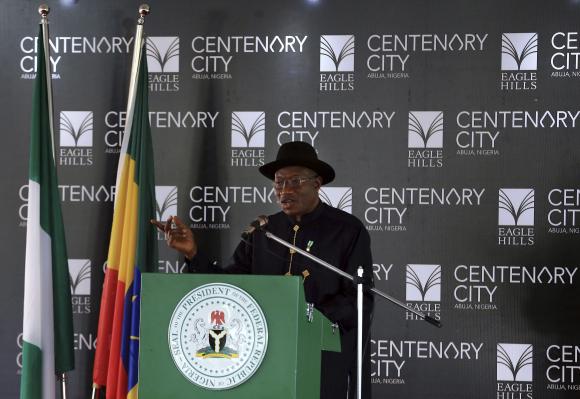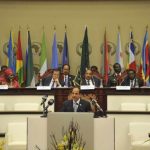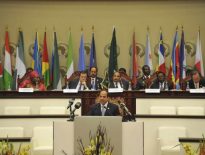(Reuters) – Nigerian President Goodluck Jonathan has cut short a trip to an African Union summit in Gabon a day after a bomb blast in Abuja, his office said on Thursday, highlighting how an Islamist insurgency could disrupt Nigeria’s regional influence.

At least 21 people were killed in a bomb blast in a crowded shopping district in Nigeria’s capital Abuja during rush hour on Wednesday, the third attack on the capital since April, but the first in the town center.
Jonathan is returning on Thursday instead of the previously planned Friday, his office said. Nigeria in July last year had to withdraw some troops from an African Union mission in Mali to redeploy them in the volatile northeast, a move seen as a knock to its long-established role as West Africa’s main peacekeeper.
Officials suspect militant Islamist group Boko Haram, by far the biggest security threat to Africa’s biggest economy and top oil producer, to be behind the blast near the Banex Plaza shopping center in the upscale Wuse 2 neighborhood.
A security source said the blast was believed to have been the work of a suicide bomber in a Honda car.
Jonathan’s deputy Namadi Sambo visited survivors on Thursday, and he urged citizens to be more vigilant in the face of the growing menace posed by Boko Haram, a Sunni Islamist group whose name means Western education is sinful and which has killed thousands since launching attacks in 2009.
Mr President (Jonathan) will not leave any stone unturned until we defeat these terrorists. We are doing everything possible to ensure … it (Boko Haram) will become a thing of the past, he told the victims and reporters on the scene.
I want to also urge us to resume our normal duties, our normal services, and to cooperate with the administration so that we jointly succeed in solving this problem, he added.
Daily gun and bomb attacks blamed on Boko Haram have left hundreds dead in the past few months. The shadowy sect seems to have stepped up its campaign since receiving unprecedented publicity over its abduction in April of more than 200 school girls in the remote northeastern village of Chibok. They remain missing.
There has been a growing pattern of attacks targeting civilians, with incidents spread across the north and center of the country.
Abuja had been targeted before – notably in an attack on the United Nations compound in August 2011 that killed 25 people – but it had largely gone quiet since 2012.
In April this year a suspected car bomb killed 75 people. Another in May killed at least 15.
A spokesman for U.N. Secretary General Ban Ki-moon said he was appalled by the bombing and that he was deeply concerned about the escalation of violence in Nigeria.
Security forces have launched an investigation after reports that as many as 91 people were kidnapped over the weekend when gunmen raided villages in Borno, but they say the incident is unconfirmed.
(Writing by Tim Cocks; Editing by Hugh Lawson)





